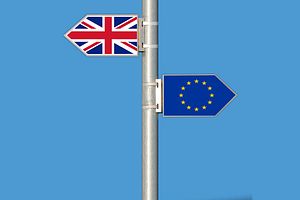With the United Kingdom having formally left the European Union on January 31, British Foreign Minister Dominic Raab is traveling to the Asia-Pacific region this week with stops in Australia, Japan, Singapore, and Malaysia. The purpose of Raab’s trip is to prepare the road for bilateral British free trade deals in a post-Brexit world, ideally finalizing these trade deals by January 2021, when Britain’s transition period ends.
Japan already has an economic partnership agreement (EPA) with the EU, which went into force last February. This deal will cover British-Japanese trade throughout the duration of the transition period, but the U.K. will need to strike its own bargain with Japan to replace it. Both the Japanese and British governments have expressed hopes that their bilateral trade deal will be more ambitious than the existing Japan-EU EPA. For the U.K., an aggressive trade deal with Japan is desirable as potential leverage to strengthen its position vis-à-vis the EU. But British desire for a comprehensive deal – and the very real deadline Brexit imposed – provides opportunities for Japan as well.
The main issue at stake will be auto tariffs. Under the Japan-EU EPA, auto tariffs are on schedule to be eliminated in eight years, but it is possible that Japan will press London for the immediate end of auto tariffs. Another issue is the possible inclusion of investor-state dispute settlement (ISDS) mechanisms. Such mechanisms allow for companies to sue foreign governments if they are treated unfairly. There is no ISDS mechanism in the Japan-EU EPA due to European opposition, but given that there is an ISDS mechanism in the Trans-Pacific Partnership agreement (of which Japan is a member) and the U.K. also wants to join the TPP, London may agree to Tokyo’s terms regarding ISDS mechanisms.
Japanese businesses are eager for the speedy conclusion of a trade deal that will return stability and predictability to doing business in Britain. Hiroaki Nakanishi, chairman of the Japan Business Federation, or Keidanren, emphasized the need for business input into the process. In a recent news conference, he emphasized that “Japan needs to conduct various talks with both the United Kingdom and the European Union in a public-private effort.” Japanese automakers may play a particularly large role in negotiations, as Nissan, Toyota, and Honda together make up about half of auto production in Britain.
With nearly 1,000 Japanese companies operating in the U.K., the government will be responsive to such concerns. Last Friday, Economy, Trade, and Industry Minister Hiroshi Kajiyama told a news conference, “I will tackle building an ambitious economic partnership with the United Kingdom.” On the same day, Foreign Minister Toshimitsu Motegi also affirmed, “We will quickly work to build a new economic partnership with Britain.”
Before Prime Minister Shinzo Abe’s second tenure as premier, Japan had been known for its protectionist trade policies. But Abe came in to office championing trade liberalization as a key driver of structural economic reform. After Donald Trump’s election in 2016 and U.S. withdrawal from the TPP the next year, Japan recast itself as a proponent of free, liberal, rules-based trade regimes. With additional momentum generated by the pressures that Brexit puts on British leaders, Abe may not only succeed in getting a bilateral trade deal, but also, with London, in expanding TPP to a trade bloc large enough to entice the wayward United States back into the regional economic architecture.
































